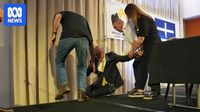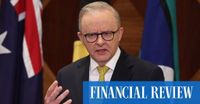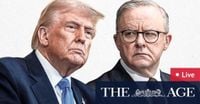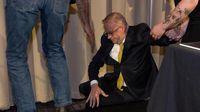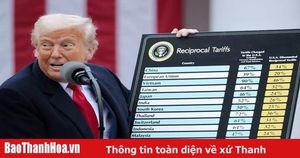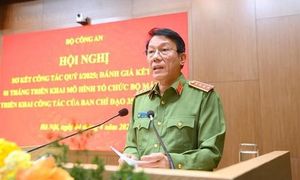In a day marked by political stumbles and significant announcements, Australian Prime Minister Anthony Albanese found himself in the spotlight for both a fall off the stage and his response to U.S. tariffs. While campaigning in Cessnock, New South Wales, Albanese took a tumble but reassured supporters he was fine, stating, "I stepped back one step. I didn't fall off the stage. Just one leg went down, but I was sweet." The incident, however, quickly became fodder for media coverage, with images of his fall circulating rapidly among journalists traveling with the opposition leader, Peter Dutton.
As the political landscape heats up ahead of the upcoming federal election, the focus shifted to the economic implications of U.S. President Donald Trump's recently announced tariffs. Albanese unveiled a five-point plan aimed at addressing the 10 percent tariff on Australian imports, which he argues will have detrimental effects on the Australian economy. In a speech delivered in Melbourne, he emphasized the importance of defending Australian industries against the tariff measures.
Meanwhile, Dutton was busy on the campaign trail, touring a manufacturing business in the Perth electorate of Hasluck. During his visit, he announced a $16.2 million upgrade for the Busselton Margaret River Airport, joking with the media about the quickness of his visit, which lasted less than 30 minutes. He remarked, "I brought the media pack to Margaret River to tease us because I wasn't going to let us drink any wine." This light-hearted comment contrasted sharply with the serious tone of political discussions surrounding U.S. trade policies.
In a related development, Treasurer Jim Chalmers warned that Trump's tariffs would likely slow global growth and increase prices worldwide. He instructed the treasury secretary to update the Commonwealth's economic modelling in light of these tariffs, indicating the government's proactive approach to mitigating potential economic fallout.
Shadow Trade Minister Kevin Hogan expressed confidence in the durability of the AUKUS alliance, stating, "I personally believe AUKUS will outlive the Trump presidency." He reiterated that despite current tensions regarding tariffs, the partnership remains vital for Australia's future. Hogan also criticized the current government's handling of tariff negotiations, suggesting that the Coalition could have secured better exemptions for Australian goods.
As the political discourse continued, Foreign Minister Penny Wong responded to comments made by former Prime Minister Paul Keating, who suggested that Trump's tariffs had "effectively killed NATO." Wong downplayed these remarks, asserting that NATO remains a crucial player in global stability. She stated, "I think it is very important to remember NATO is a very important contributor to global peace and stability." Wong further defended Australia's position, claiming that no other country is in a better situation regarding U.S. tariffs, despite the challenges posed by the recent policy changes.
On the other hand, Dutton found himself in hot water after making remarks that suggested he would use defense and security as leverage in negotiations with the U.S. When pressed to clarify, he stated, "It's about what we can bring to the table in a bigger deal with the United States." His comments raised eyebrows, with Wong labeling him "delusional" for believing he could secure a better deal than the current government.
The political landscape is further complicated by the Coalition's stance on labor laws, with Dutton confirming that his party will not repeal the Same Job, Same Pay laws established in 2023. This legislation has been a point of contention, particularly in the mining sector, as Labor has argued that a Coalition government could threaten these rights.
As the election campaign unfolds, both leaders are navigating a complex web of economic and political challenges. Albanese's commitment to advancing a media bargaining code that requires big tech companies to fund journalism remains a priority, despite being flagged as a trade grievance by Trump's administration. Albanese asserted the importance of protecting journalism, stating, "The media bargaining code is essential for ensuring that journalism can thrive in this new digital landscape."
The day concluded with the United Kingdom announcing a parliamentary inquiry into the AUKUS partnership, reflecting ongoing geopolitical shifts and the implications of U.S. foreign policy on international alliances. This inquiry comes on the heels of Trump's apparent unfamiliarity with the agreement during a recent press conference, raising questions about the future of trilateral cooperation between Australia, the U.S., and the UK.
As both Albanese and Dutton continue to rally their bases, the impact of U.S. tariffs, domestic policy decisions, and international relations will undoubtedly shape the narrative leading up to the election. With the stakes higher than ever, voters are left to ponder how these developments will influence their choices at the polls.
